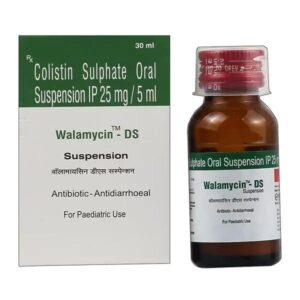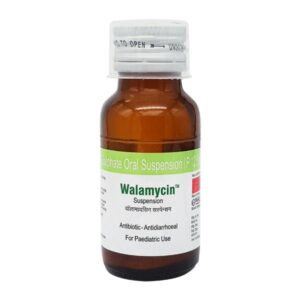COLISTIN
COLISTIN: Colistin, also known as polymyxin E, is a powerful antibiotic primarily used for the treatment of severe infections caused by multidrug-resistant bacteria. It belongs to the class of antibiotics known as polymyxins.
Mechanism of Action:
Colistin works by targeting the bacterial cell membrane, disrupting its integrity and function. It binds to the lipopolysaccharide component of the outer membrane of Gram-negative bacteria, causing disruption and leakage of intracellular contents, leading to cell death. It is effective against a wide range of bacteria, including Pseudomonas aeruginosa, Escherichia coli, Klebsiella pneumoniae, and Acinetobacter baumannii.
Use:
Colistin is mainly used as a last-resort treatment for severe infections caused by multidrug-resistant bacteria, particularly in the cases of pneumonia, bloodstream infections, urinary tract infections, and wound infections. It is typically used when no other alternative antibiotics are effective against the infecting bacteria.
Dose:
Colistin is available in different formulations, including intravenous (IV) and inhaled forms. The dosage and duration of treatment depend on the infection being treated, the patient’s weight, renal function, and other factors. It is usually administered in divided doses every 8 to 12 hours.
Side Effects:
While colistin is an effective antibiotic, it is associated with a number of potential side effects, including:
1. Nephrotoxicity: Colistin can cause kidney damage. It is important to monitor renal function closely during treatment, especially in patients with existing kidney problems.
2. Neurotoxicity: In some cases, colistin can lead to neurotoxicity, causing symptoms such as dizziness, confusion, and seizures.
3. Respiratory complications: Inhalation of colistin can occasionally cause bronchospasm and bronchial irritation, leading to coughing and difficulty breathing.
4. Gastrointestinal disturbances: Colistin can cause gastrointestinal side effects like nausea, vomiting, and diarrhea.
5. Allergic reactions: Rarely, colistin can trigger allergic reactions, characterized by rashes, itching, swelling, or anaphylaxis.
It is crucial to monitor patients closely for any adverse events during colistin treatment and to weigh the benefits against the risks, especially due to its potential for kidney and neurological toxicity.


